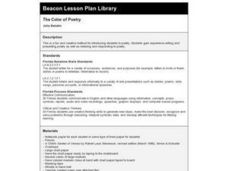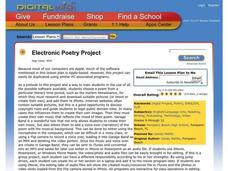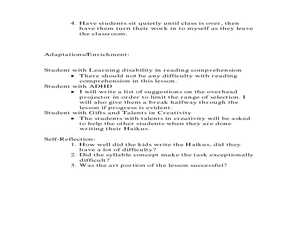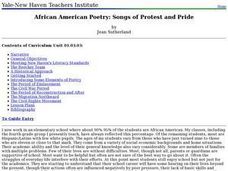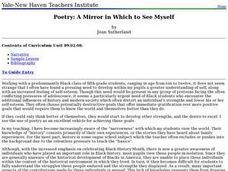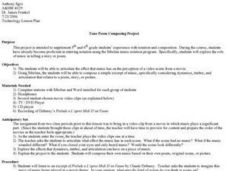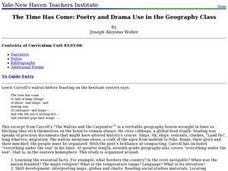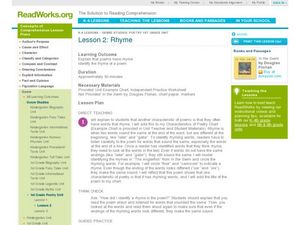Curated OER
The Color of Poetry
Young scholars listen to a story about colors and then write their own color poems.
Curated OER
"Giggle Poetry" Theater
Learners read and perform "Giggle Poetry Theater." In small groups, they read the poems, collect props, rehearse, and present their poem to their classmates.
Curated OER
Making Poetry Writing Fun!
Students find a group of words from an unlikely source and turn them into a poem. They discuss the central image in two well-known poems by Langston Hughes and Emily Dickinson. They write their own short poem expressing one central...
Curated OER
Poetry Pop-Up
Third graders, after exploring the process of writing poetry through imagery words that go beyond pen and paper, create a Poetry Pop-Up Book. They incorporate the use of the Thesaurus and clip-art/digital photography to assist them in...
Curated OER
Tricks of the Trade A Collection of Concrete Poems-for writing concrete poems
Students explore concrete poetry. In this lesson about poetry, students read A Poke in the I, by Paul B. Janeczko, and are introduced to concrete poems. Students read several different kinds of concrete poems including single-word, and...
Curated OER
Poetry Shared Reading
Students explore poetry. For this poetry lesson, students discover the qualities of good writing and the characteristics of poetry. Students practice reading poems in different ways. Studnets also discuss the mood of the poem and the...
Curated OER
Poetry: Using Prosodic Devices
Students examine poetry examples in free verse focusing on their prosodic elements. After critiquing works by several authors, they write their own poems utilizing such devices as alliteration, repetition, rhyme, and stanzas.
Curated OER
Poetry and Visualization
Students use visualization techniques when reading poetry. In this visualization and poetry lesson, students work in groups to present a tableau that depicts a word from the poem as classmates guess the word. Students then...
Curated OER
Peace and Perspective through Poetry: The Dream of Peace in the Middle East
Middle schoolers use poetry to understand conflict in the Middle East. In this poetry instructional activity, students read persona poems and use the poetry and a novel as mentor text to guide their own poem about peace in the...
Curated OER
Water is Life, Water is Poetry
Students read poems about water and relate to their own experiences. In this poetry lesson, students create drawings relating to a specific relevant memory. Students write a poem about the same event as their illustration.
Curated OER
Border Poetry/Writing Workshop
Young scholars analyze a poem set in the U.S.-Mexico borderlands and defend their own interpretations of the work. They demonstrate understanding of poetic technique by writing their own poems of living on the border.
Curated OER
America Poems
Students examine examples of how other Americans have expressed their feelings about America through songs and poetry, and write their own poems to express their relationship with America.
Curated OER
Electronic Poetry Project
Students create a digital project to go with a poem. In this technology lesson, students pick a poem and create images to go with it. They make background music for the narration of their poem and attach it to a PowerPoint...
Curated OER
In the Middle - Middle School Poetry
Students analyze and interpret poems. In this poetry lesson plan, students are read poems aloud, discuss the meanings in groups, and complete two worksheets after listening to the poems. Links to the worksheets and discussion...
Curated OER
Place and Character in Poetry
Learners examine how place in poetry helps give clues about character. In this poetry activity, students read a poem while focusing on the descriptions of the room that is being described and predict what type of person would live there....
Curated OER
Digital Poetry Books
Learners, after reviewing the writing process and assessing how to use a digital camera to take creative photos, create a Digital Poetry Book. They incorporate the use of Microsoft Photo Draw and Publisher for the creation of their...
Curated OER
Poetry: "Seven Types of Shadow"
Students examine the way ghosts are portrayed in films and literature. In this poetry lesson, students listen to the first five stanzas of the poem "Seven Types of Shadow" read by U A Fanthorpe on The Poetry Archive website and...
Curated OER
Haiku Poems
Eighth graders study haiku poems. In this poetry lesson, 8th graders write two haikus containing the standard 5-7-5 syllables content about things they enjoy within nature.
Curated OER
African American Poetry: Songs of Protest and Pride
Students are introduced to various time periods in history in which African Americans wrote songs and poetry to cope. In groups, they travel between different stations to listen or read poems and music from the Civil War period, Civil...
Curated OER
Poetry: A Mirror in Which to See Myself
Fifth graders focus on their self-esteem and strengths while reading poetry. In groups, they research the contributions and achievements of African-Americans and discuss how they overcame obstacles. They are read a poem, define new...
Curated OER
Tone Poem Composing Project
Students explore role of music in storytelling by watching and discussing effect music has on perception of scene from movie, and using Sibelius program to compose single excerpt of music, considering dynamics, timbre, and articulation,...
Curated OER
The Time Has Come: Poetry and Drama Use in the Geography Class
Students use drama and poetry in their Geography class. In groups, they role play an interviewer or the interviewee in various plays that were presented to them. In their role, they must locate and label where the countries mentioned...
Curated OER
Rhyme
First graders explore rhyme through the use of poems. In this language arts lesson, 1st graders read poems and identify words that rhyme within the poem. Students circle the rhyming words within a poem as they listen.
Curated OER
Over the River and Through the Woods:Prepositional Poetry
Fifth graders will be able to identify and use prepositions correctly in written work.¿¿¿ They will also be able to identify poetic devices.They will see how their writing can be more descriptive and "visual" for their audience.
